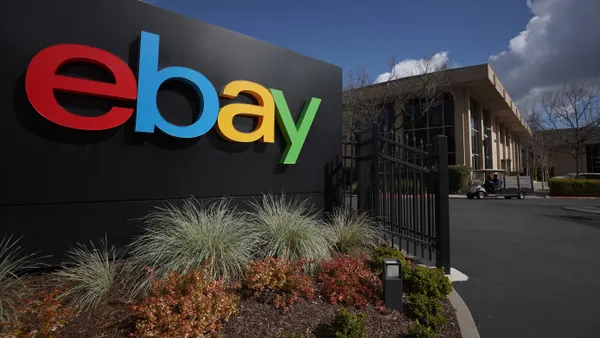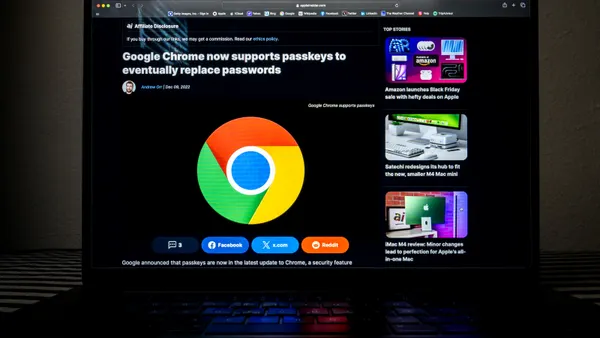Dive Brief:
-
Amazon on Wednesday said that Cyber Monday was its single biggest shopping day ever, surpassing its Prime Day event over the summer for the most products ordered worldwide, according to a press release emailed to Retail Dive. The best-selling item that day was its Echo dot device, Amazon said.
-
Over what the company is calling, "the Turkey five," the five days from Thanksgiving to Cyber Monday, customers ordered nearly 140 million items from small businesses worldwide, Amazon also said. Orders on Cyber Monday via Amazon's app increased more than 50% worldwide from last year.
-
Under Amazon's ownership, Whole Foods Market in the U.S. broke its all-time record of turkeys sold during the Thanksgiving season, thanks to lower prices and even deeper discounts for Prime members, the company said.
Dive Insight:
Amazon this summer bragged that its Prime Day event in July surpassed both Black Friday and Cyber Monday of 2016, but Cyber Monday this week appears to have topped that. Prime Day 2017 — which lasted 30 hours this year compared to 24 hours in the two previous years — grew by more than 60% compared to the same 30 hours in 2016, and sales growth by small businesses and entrepreneurs was even higher, Amazon said in July.
Small businesses worldwide also benefited from selling on Amazon on Cyber Monday this year, with Amazon shoppers ordering nearly 140 million units from small businesses and entrepreneurs globally during that day, according to statistics from Amazon CEO of Worldwide Consumer Jeff Wilke, which were emailed to Retail Dive. Several businesses set records with their Cyber Monday Amazon sales.
"Amazon customers shopped at record levels during the Turkey 5, ordering hundreds of millions of products from toys to fashion to electronics and Amazon devices," Jeff Wilke, CEO of Worldwide Consumer, said in a statement emailed to Retail Dive. "Customers ordered nearly 140 million items from small businesses alone and this is just the beginning of the holiday season. We'll continue to offer incredible deals and a vast selection of unique products, with fast and free shipping options all season long, and every day."
The Echo Dot was a winner on both Prime Day and on Cyber Monday. The portable Alexa-enabled speaker was not only the best-selling Amazon device, but also the best-selling product from any manufacturer in any category across Amazon globally this summer. Prime members purchased seven times more Amazon Echo devices globally during this year's event than on Prime Day last year.
To drive sales, Amazon has aggressively priced its Echo and Echo Dot speakers at the holidays this year, offering the Echo for $79.99 and the Echo Dot for $29.99, a $20 discount in both cases. The dominant voice assistants are in something of an arms race over the holidays — Google also cut the regular price on its Google Home Mini by $20, to $29, and Google's retail partners, including Best Buy, Williams-Sonoma and Office Depot, were offering similar deals through their own channels.
Amazon controls some 70% of the $4 billion market for voice-activated smart speakers, so that move is likely motivated less by market share or even sales revenue and more a play for ubiquity — a chance to get more devices into the homes of both new and existing customers.
Some 35.6 million Americans will use a voice-activated assistant device at least once a month this year, according to research released in May from eMarketer. If that forecast proves correct, it would be a 129% jump in voice engagement with virtual assistants over last year.
The battle is just getting started and is being fueled by the holiday season, Luke Starbuck, VP of Marketing at customer care automation platform Linc, told Retail Dive earlier this month. He notes that the perception of voice assistance as futuristic has become a reality. A huge majority (87%) of retailers expect to be using AI for customer service and engagement within the next 24 months, while 41% are using it or experimenting with it already, according to Linc's research.
A major catalyst for the growing emphasis on voice assistants is a recognition by brands of the importance of a customer-centric purchase and service journey, and of building stronger relationships that lead to future purchases, according to Starbuck. "By giving customers more ways to order and track shipments (via voice, chatbots, etc.) shoppers will be more willing to buy again following a fluid and streamlined buying process," he said.
This story is part of our ongoing coverage of the 2017 holiday shopping season. You can browse our holiday page and sign up for our holiday newsletter for more stories.













